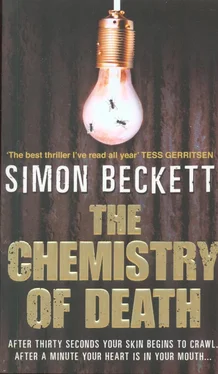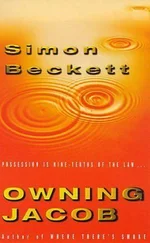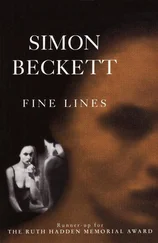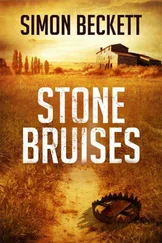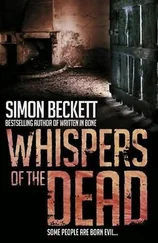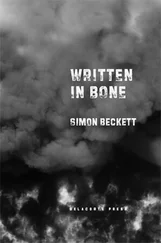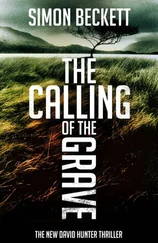Simon Beckett - The Chemistry of Death
Здесь есть возможность читать онлайн «Simon Beckett - The Chemistry of Death» весь текст электронной книги совершенно бесплатно (целиком полную версию без сокращений). В некоторых случаях можно слушать аудио, скачать через торрент в формате fb2 и присутствует краткое содержание. Жанр: Триллер, на английском языке. Описание произведения, (предисловие) а так же отзывы посетителей доступны на портале библиотеки ЛибКат.
- Название:The Chemistry of Death
- Автор:
- Жанр:
- Год:неизвестен
- ISBN:нет данных
- Рейтинг книги:5 / 5. Голосов: 1
-
Избранное:Добавить в избранное
- Отзывы:
-
Ваша оценка:
- 100
- 1
- 2
- 3
- 4
- 5
The Chemistry of Death: краткое содержание, описание и аннотация
Предлагаем к чтению аннотацию, описание, краткое содержание или предисловие (зависит от того, что написал сам автор книги «The Chemistry of Death»). Если вы не нашли необходимую информацию о книге — напишите в комментариях, мы постараемся отыскать её.
The Chemistry of Death — читать онлайн бесплатно полную книгу (весь текст) целиком
Ниже представлен текст книги, разбитый по страницам. Система сохранения места последней прочитанной страницы, позволяет с удобством читать онлайн бесплатно книгу «The Chemistry of Death», без необходимости каждый раз заново искать на чём Вы остановились. Поставьте закладку, и сможете в любой момент перейти на страницу, на которой закончили чтение.
Интервал:
Закладка:
'Please…' Her voice was a parched croak she barely recognized. 'Please, why are you doing this?'
Her question was met by silence, broken only by the sound of his breathing. The smell of burning tobacco hung in the air. There was rustling, an indistinct sound of movement.
Then the music began to play again.
11
Thursday was the day when the chill began to set into Manham. Not a physical chill – the weather remained as hot and arid as ever. But regardless of whether it was an inevitable reaction to recent events or a result of Scarsdale's sermon, the psychological climate of the village seemed to undergo a marked change overnight. Now that it was no longer possible to lay blame for the atrocities on an outsider, the village had little choice but to turn its scrutiny on itself. Suspicion stole in like an airborne virus, not apparent at first, but already carried unknown by the first victims.
Like any contagion, there were those who were more vulnerable than others.
I was unaware of this as I came back from the lab in the early evening. Henry had agreed to cover for me again, waving away my suggestion of bringing in a locum. 'Take as long as you want. Do me good to get my finger out for once,' he'd said.
I drove with the windows full down. Once I was away from the busiest roads, the air was scented with pollen, a tickling sweetness that overlay the faintly sulphurous scent of drying mud from the reedbeds. It was a welcome counter to the chemical stink of detergent that still seemed to coat the back of my nose and throat. It had been a long day, most of which had been spent working on Sally Palmer's remains. Occasionally I still felt an odd schism if I tried to reconcile my memories of the extrovert, vital woman I'd known with the collection of bones that had been boiled of any last vestiges of flesh. But that wasn't something I wanted to dwell on.
Luckily, there was too much to do for my thoughts to wander.
Unlike skin and flesh, bone retains the impression of anything that cuts into it. In Sally Palmer's case, some of these were little more than scratches, revealing nothing. There were three places, though, where the blade had gone deep enough to leave an ossified record of its passing. Where her back had been cut for the swan wings, the flat bone of both shoulder blades bore matching grooves. About six or seven inches long, each had been made with a single, sweeping stroke. That much was apparent from the way the wounds were shallower at either end than they were in the middle; in both cases the knife had travelled across the scapula in an arc rather than been thrust. Slashed rather than stabbed.
I'd used a tiny electric saw to carefully cut longitudinally along one of the grooves, so it was split down its full length. Marina had hovered curiously nearby as I'd examined the exposed surfaces where the knife had cut through the bone. I motioned her to take a look.
'See how the sides are smooth?' I asked. 'That tells us the knife wasn't serrated.'
She peered at it, frowning. 'How do you know?'
'Because a serrated blade makes a pattern. A bit like when you cut wood with a buzz saw.'
'So these weren't caused by anything like a bread or steak knife.'
'No. It was sharp, though, whatever it was. See how clean and well defined the cuts are? And they're quite deep. Four, five millimetres in the middle.'
'Does that mean it was big?'
'I'd say so. Could be something like a large kitchen or butcher's knife, but I'd guess some sort of hunting knife was more likely. The blades on those tend to be heavier and less flexible. Whatever did this didn't bend or wobble. And the cut itself is quite wide. Meat knives are much thinner.'
A hunting knife also tied in with the killer's obvious woodcraft, though I didn't say that. I'd taken photographs and measurements of both shoulder blades before turning to the third cervical vertebra. This was the section of bone that had sustained most damage, caused when Sally Palmer's throat had been cut. It was a different sort of wound, almost triangular in shape. Stab, not slash. The killer had plunged the knife into her throat point-first, then drawn it across her trachea and carotid artery.
'He's right-handed,' I said.
Marina looked at me.
'The depression in the vertebra's deep at the left-hand side, then tapers off to the right. So that's the way he cut.' I pointed at a spot on my own throat and drew my finger across. 'Left to right. Which suggests he's a right-hander.'
'Couldn't it have been done backhanded?'
'That would have made it more of a slash, like on the shoulder blades.'
'From behind, then? You know, to avoid the blood.'
I shook my head. 'Makes no difference. He might have stood behind her to do it, but in that case he'd still reach around, put the knife in, and then pull it back across her throat. Left to right, for a righthander. If not it would mean pushing the knife rather than pulling it. Too awkward, and it would make a different-shaped mark in the bone.'
She was silent as she went through it in her mind. She gave a nod when she accepted it. 'That's pretty cool.'
No, I thought. Just the sort of thing you pick up when you've seen enough of it.
'Why do you say "he"?' Marina asked, abruptly.
'Sorry?'
'When you're talking about the killer you always talk as if it's a man. But there are no witnesses, and the body's too far gone for us to find any evidence of rape. So I just wondered how you knew.' She shrugged, embarrassed. 'Is it just a figure of speech or have the police found something out?'
I hadn't given it much thought, but she was right. I'd automatically assumed the killer was male. Everything so far pointed to it – physical strength, female victims. But I was surprised I'd taken something like that for granted.
I smiled. 'Force of habit. It usually is. But no, I don't know for sure.'
She looked at the bones we'd been so clinically examining. 'I think it's a man too. Let's hope they catch the bastard.'
Thinking about what she'd said, I almost missed the final piece of evidence. I'd examined the vertebra under a bright light and low-powered microscope, and it was only as I was about to straighten that I spotted it. A tiny black fleck, lying like rot at the deepest point of the hole carved by the knife. But whatever it was, this was no rot. I carefully scraped it out.
'What's that?' asked Marina.
'No idea.' But I felt a race of excitement. Whatever it was, the only way it could have got there was on the tip of the killer's knife. Perhaps it was nothing.
Perhaps.
I sent it off to the forensic lab for spectroscopic analysis, something I had neither the expertise nor equipment to carry out myself, and started making plaster casts of the knife cuts in the bones. If the weapon that had caused them was ever found, it would be possible to identify it simply by seeing if it fitted – a match every bit as conclusive as Cinderella's slipper.
I was almost done now. It was just a matter of waiting for the lab results, not only on whatever substance I'd just found but for the other tests from the day before. They would give an accurate time-since-death, and once I had that I would be finished. My role in Sally Palmer's death, a far more intimate one than we'd ever shared while she was alive, would be over. I could retreat back to my new life, bury myself away again.
The prospect didn't bring the relief I'd expected. Or perhaps it was that, even then, I knew it wouldn't be as simple as that.
I had just washed and dried my hands when there was a rap on the steel door. Marina went to see who it was, and came back with a young policeman. With a sinking feeling, I eyed the cardboard box he was holding.
'Chief Inspector Mackenzie's sent this.'
He looked for somewhere to put it down. I pointed at the empty stainless-steel table, knowing what would be inside.
Читать дальшеИнтервал:
Закладка:
Похожие книги на «The Chemistry of Death»
Представляем Вашему вниманию похожие книги на «The Chemistry of Death» списком для выбора. Мы отобрали схожую по названию и смыслу литературу в надежде предоставить читателям больше вариантов отыскать новые, интересные, ещё непрочитанные произведения.
Обсуждение, отзывы о книге «The Chemistry of Death» и просто собственные мнения читателей. Оставьте ваши комментарии, напишите, что Вы думаете о произведении, его смысле или главных героях. Укажите что конкретно понравилось, а что нет, и почему Вы так считаете.
